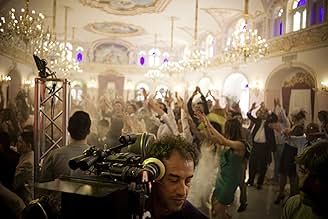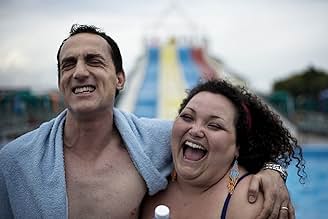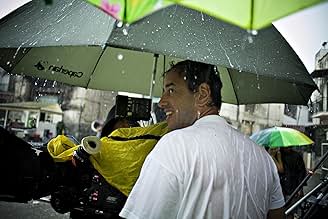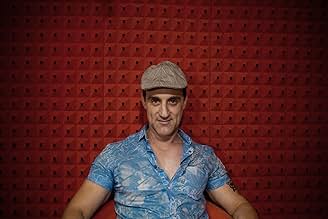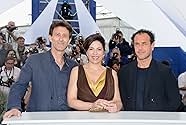IMDb RATING
6.8/10
5.9K
YOUR RATING
Luciano is a charming fishmonger whose unexpected and sudden obsession with being a contestant on a reality show leads him down a rabbit hole of skewed perceptions and paranoia.Luciano is a charming fishmonger whose unexpected and sudden obsession with being a contestant on a reality show leads him down a rabbit hole of skewed perceptions and paranoia.Luciano is a charming fishmonger whose unexpected and sudden obsession with being a contestant on a reality show leads him down a rabbit hole of skewed perceptions and paranoia.
- Awards
- 12 wins & 19 nominations total
Featured reviews
Garrone's magical movie opens with bows to two great scenes of Italian cinema: the ornate wedding carriage recalls the child's funeral procession from The Gold of Naples, and the helicopter-borne star of a reality show replays the helicopter ride of Jesus in La Dolce Vita. These images evoke Italy as the longest-running "society of the spectacle": Roman games; Renaissance princes and popes who conned everyone, as Machiavelli says; the splendors of the Counter-Reformation Church; and media mogul Silvio Berlusconi with the sun in his pocket-"il sole in tasca."
Luciano--fish monger, petty con artist, and pater familias--longs to be cast in a reality show called Big Brother. His quest becomes increasingly obsessive and fantasmagoric, and his extended family shifts from humorous support to escalating concern. Will his dream come true?
Aniello Arena in the part of Luciano is terrific and will capture your heart; he has a surprising and poignant story of his own, which you can check online for yourselves. Garrone is a master of production design, creating exuberant post-modern sets in which decaying Neapolitan palazzi mingle with malls and water slides. This movie is perhaps not for everyone-only for those prepared to enter a world that is theatrical, flamboyant, sentimental, and ironic--one that calls for a sense of humor and a big heart.
I saw this film as part of the Rotterdam film festival 2013 (IFFR), about someone pressured by his family to candidate himself for a Big Brother house. It all gets out of hand when he is not accepted initially but yet thinks to be on a sort of waiting list while being observed by the Big Brother team. He assumes being selected for a very special role in that TV show, and will be given a part later on when he proves to fit their criteria.
During the final Q&A the director said that the film is about dreaming to escape from reality and to loose one's identity. He describers the main character (Luciano) to be a victim of the system. Luciano desire to get into the Big Brother house comes from initial pressure by his family, though later on he himself gets a bit mad about it. He continues with rigor, in spite of protests from the same family that pressured him in the first place. The importance of the family cannot be stressed enough and has a crucial role in the story, something typical for Italy as stated by the director.
The story forming the basis for this scenario really happened to a brother of the director's wife. (By the way: He is fully recovered now. He has even re-opened his fish shop at the same spot in Naples.) And giving away his furniture to make a good impression on imaginary inspectors, was also real, even to the extent that his wife did not dare leaving the house in fear of finding it empty on return. Even the cricket that Luciano suspected to be full of camera's, appeared in reality too. The ending scenes seem a bit far fetched (I won't reveal details, for spoilers sake), but can be deemed all right if it really comes from the true story that was the basis of this film.
The director also said that the actors were taken from theater or cabaret (except one, a family member). Faces were an important criterion in the selection process. The roles they play and their appearances reflect a "normal" family from the region. That explains the overload of wrinkled people, and especially women looking like the stereotypical "mama" that we see in food commercials. Luckily, the main characters (Luciano and his wife) are not so bad looking, in contrast to their entourage.
All in all, the film is a nice product with many hilarious moments. It is a bit too long, in my opinion, particularly when you get easily annoyed by heavily gesturing Italians, talking with a waterfall of words (it looks that way for us, understanding no Italian) and overly dramatic movements. We won't consider this movie memorable, but it serves its purpose as family entertainment very well. Anyway, the audience seemed to enjoy themselves nevertheless. The venue (over 500 seats) was fully booked on a Sunday morning.
During the final Q&A the director said that the film is about dreaming to escape from reality and to loose one's identity. He describers the main character (Luciano) to be a victim of the system. Luciano desire to get into the Big Brother house comes from initial pressure by his family, though later on he himself gets a bit mad about it. He continues with rigor, in spite of protests from the same family that pressured him in the first place. The importance of the family cannot be stressed enough and has a crucial role in the story, something typical for Italy as stated by the director.
The story forming the basis for this scenario really happened to a brother of the director's wife. (By the way: He is fully recovered now. He has even re-opened his fish shop at the same spot in Naples.) And giving away his furniture to make a good impression on imaginary inspectors, was also real, even to the extent that his wife did not dare leaving the house in fear of finding it empty on return. Even the cricket that Luciano suspected to be full of camera's, appeared in reality too. The ending scenes seem a bit far fetched (I won't reveal details, for spoilers sake), but can be deemed all right if it really comes from the true story that was the basis of this film.
The director also said that the actors were taken from theater or cabaret (except one, a family member). Faces were an important criterion in the selection process. The roles they play and their appearances reflect a "normal" family from the region. That explains the overload of wrinkled people, and especially women looking like the stereotypical "mama" that we see in food commercials. Luckily, the main characters (Luciano and his wife) are not so bad looking, in contrast to their entourage.
All in all, the film is a nice product with many hilarious moments. It is a bit too long, in my opinion, particularly when you get easily annoyed by heavily gesturing Italians, talking with a waterfall of words (it looks that way for us, understanding no Italian) and overly dramatic movements. We won't consider this movie memorable, but it serves its purpose as family entertainment very well. Anyway, the audience seemed to enjoy themselves nevertheless. The venue (over 500 seats) was fully booked on a Sunday morning.
I'm not afraid to admit that I actually prefer this film to Garrone's previous characters-melange crime-drama GOMORRAH (2008, a 7/10), albeit both won Cannes's Grand Prize of the Jury in their respective years.
I watched the film in KVIFF a few days ago, and I am thrilling to see that there is a change of attitude in detailing a riveting story of Naples people's mundane life, about a reality-show sparks a never-be-quenched yearning of a Naples fishmonger's pipe dream of becoming a reality-star, which turns him paranoid about his surroundings and mars his and his family's life, and all winds up in an ambiguous ending.
REALITY has a drastic alternation in its visual impetus, a Fellini-esque Napoli milieu (with the mammoth structure of kins under a dilapidated tableaux), which could instantly gain some positive impression from the film's opening sequence, which induces a tremendously lush wedding ceremony. A comical tone has never ceased to hover around the typical but accurate portrayal of the workaday life of our protagonist and his family (a hanky-panky retail business of pasta-making robots is the highlight) until the latter part when everyone on screen and offscreen realize the one-sided opportunity will never arrive except for our leading man in the film, so literally how miserable his ending would be has grown into the main concern hanging the film's weight. And there would be a great chance it would plunge into an irreversible maw of tragedy, but luckily it doesn't, Garrone alters a lightly grotesque route and resorts to a more theatrical maneuver to leave the finale in a spell bound shot, effectively ridicules and bashes the reality-show oriented credo in the present-time.
The gorgeous score from extraordinarily talented composer Alexandre Desplat is another selling point, seamlessly goes with the plot, and thwarts a likely bathos when the soothing comedic temper is steadily mitigated and the film veers to a suspicious restlessness and ultimately the irrational madness.
The cast is plainly spot-on in spite of Aniello Arena's over-handsome and beefcake image as a fishmonger, Raffaele Ferrante's rendering of a reality-star who originally rose from the mass, is both hilarious and sarcastic in stressing the ill-infused celebrity-rules notion, which is indubitably not the only entrance to fame and fortune for those wide-eyed dreamers.
I watched the film in KVIFF a few days ago, and I am thrilling to see that there is a change of attitude in detailing a riveting story of Naples people's mundane life, about a reality-show sparks a never-be-quenched yearning of a Naples fishmonger's pipe dream of becoming a reality-star, which turns him paranoid about his surroundings and mars his and his family's life, and all winds up in an ambiguous ending.
REALITY has a drastic alternation in its visual impetus, a Fellini-esque Napoli milieu (with the mammoth structure of kins under a dilapidated tableaux), which could instantly gain some positive impression from the film's opening sequence, which induces a tremendously lush wedding ceremony. A comical tone has never ceased to hover around the typical but accurate portrayal of the workaday life of our protagonist and his family (a hanky-panky retail business of pasta-making robots is the highlight) until the latter part when everyone on screen and offscreen realize the one-sided opportunity will never arrive except for our leading man in the film, so literally how miserable his ending would be has grown into the main concern hanging the film's weight. And there would be a great chance it would plunge into an irreversible maw of tragedy, but luckily it doesn't, Garrone alters a lightly grotesque route and resorts to a more theatrical maneuver to leave the finale in a spell bound shot, effectively ridicules and bashes the reality-show oriented credo in the present-time.
The gorgeous score from extraordinarily talented composer Alexandre Desplat is another selling point, seamlessly goes with the plot, and thwarts a likely bathos when the soothing comedic temper is steadily mitigated and the film veers to a suspicious restlessness and ultimately the irrational madness.
The cast is plainly spot-on in spite of Aniello Arena's over-handsome and beefcake image as a fishmonger, Raffaele Ferrante's rendering of a reality-star who originally rose from the mass, is both hilarious and sarcastic in stressing the ill-infused celebrity-rules notion, which is indubitably not the only entrance to fame and fortune for those wide-eyed dreamers.
When I started watching this movie I thought "Well, the director is Garrone and the movie is set in Naples, so it must be a copy of Gomorrah or something like that". Instead I was surprised of how Garrone nicely brought up another aspect of Naples and its inhabitants. The setting is a poor neighborhood in the Italian port city and the main character is Luciano, a fishmonger and father of two children. His daily life is ordinary and uneventful and he struggles to earn money through his first job and his second one which consists in cheating people by selling them some cleaning devices. Everything could change when he has the opportunity to participate to the Big Brother rehearsals where he can exploit his qualities as entertainer. His certainty of making it to the show is so strong that he becomes paranoid about people of the Big Brother casting staff spying on him to see if he's really a character as he claims to be in everyday life. He does many crazy things like selling his fishmonger activity and doling out his personal belongings to poor people in order to impress the alleged casting personnel following him. His mental condition soon worsens and develops into craziness which of course affects inevitably his family life. What I liked best about this movie is how Garrone underlines how miserable everyday life can be and how everyone is in search of the big opportunity to get out of misery. This however can lead to ruining personal and family life. I also appreciated how the director shows how some feelings and actions can be so evidently false as that of Luciano of being overly generous with poor people only for personal purposes. One last thing I would like to mark is Garrone's style of shooting, which was quite like that of Gomorrah, that's very simple and with seemingly amateur close shootings. Compared to Gomorrah however I would say that he wanted to give a more dreamy touch and also something Fellinesque: in one scene Luciano comes back home from the Big Brother rehearsal in Rome and, in the beautifully lit neighborhood, he's welcomed by his neighbors as a hero. In the next scene the neighborhood is showed in daytime during its normal daily activity, presenting all its simplicity and misery. Therefore an evident contrast is shown between dream and reality.
Reality is a fitting title about a man who totally lost it (his own sense of reality).
Part satire, part a comic-tragic portrait of our world with its vanities our hero is just an everyday guy who is a fishmonger, and like many others has a souse, children with all that goes with it.
His world is shaken when following a brief performance in a wedding reception he becomes acquainted with a celebrity and the desire is born in him that he can be part of this world, the world of stardom, wealth and recognition.
So by making use of this brief acquaintance he enters a competition to join big brother and does so in the certainty it will be his passport to fame and fortune. The contact with fame though ludicrously brief it is enough to cause him a great deal of harm.
The harm came in the form of obsessive behaviour, paranoia and hallucination causing a loss of his own self awareness and disregard for all those around him.
A charmer of a movie about vanity, obsession and a surrounding culture that feeds us these kind of fake feelings and desires.
Part satire, part a comic-tragic portrait of our world with its vanities our hero is just an everyday guy who is a fishmonger, and like many others has a souse, children with all that goes with it.
His world is shaken when following a brief performance in a wedding reception he becomes acquainted with a celebrity and the desire is born in him that he can be part of this world, the world of stardom, wealth and recognition.
So by making use of this brief acquaintance he enters a competition to join big brother and does so in the certainty it will be his passport to fame and fortune. The contact with fame though ludicrously brief it is enough to cause him a great deal of harm.
The harm came in the form of obsessive behaviour, paranoia and hallucination causing a loss of his own self awareness and disregard for all those around him.
A charmer of a movie about vanity, obsession and a surrounding culture that feeds us these kind of fake feelings and desires.
Did you know
- TriviaAniello Arena, the lead actor, served nearly 30 years in prison for murder and was on parole when "Reality" was filmed.
- ConnectionsFeatured in At the Movies: Episode #10.21 (2013)
- How long is Reality?Powered by Alexa
Details
Box office
- Gross US & Canada
- $72,577
- Opening weekend US & Canada
- $7,072
- Mar 17, 2013
- Gross worldwide
- $3,350,996
- Runtime1 hour 56 minutes
- Color
- Sound mix
- Aspect ratio
- 2.39:1
Contribute to this page
Suggest an edit or add missing content



